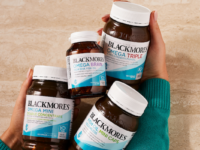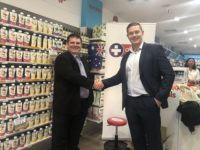 People have a right to know where their products come from, says Bulla boss, and most of them want to support local industry.
People have a right to know where their products come from, says Bulla boss, and most of them want to support local industry.
Authenticity, alignment and culture are at the core of Bulla boss Allan Hood’s transformation strategy for the dairy giant.
It has been over 18 months since he stepped into the top job at Australia’s largest privately owned dairy company, and he says business has been tough.
“You win some, you lose some, but we have had a couple of years where trading conditions have been quite challenging,” he told Inside FMCG in an interview for our July edition. “Whether it be through retailer pressure or cost pressure, we are operating in a price-deflation market.”
While times are hard for manufacturers, Hood says he really feels for the dairy farmers affected by Australia’s current milk-price crisis.
“It’s a very challenging time for farmers,” he said, confirming that Bulla buys through a co-operative that has about 50 farmers and pays an ‘above-market, fair’ price.
“Certainly in Victoria up until late it has been a very dry period as well, which increases costs for farmers, and this has just added to their woes.
“As manufacturers, we don’t know the price of our raw materials. We are trying to lock down contracts and budgets, and there are just so many moving parts at the moment.”
Despite tough times and competition, Hood said the future is bright for Bulla. “We believe we have a clear strategy and can see our way out of this.”
Hood told Inside FMCG about the turnaround plan, Bulla’s ‘unfakeable’ campaign and what’s next for the dairy giant.
Inside FMCG: You have described the past couple of years as ‘tough’. What’s on the agenda for Bulla?
Allan Hood: We have some great innovation coming out of the business. The new products we are putting to market have been consistently successful. That is fantastic, because it creates the level of newness our customers demand.
You can’t always be perfect, but I do believe we are being more consistent in what we are putting out into the marketplace, and it seems to be resonating with consumers.
We also have a clear business strategy. We are owned by three separate families, so having a clear and aligned strategy is important. It means there is clarity right throughout the business – from the board to the factory floor – about where we are going as a business, and our priorities. We still have to be agile and change, but at least we have that direction.
Another major focus is culture. We have embarked on a program as part of our transformation agenda that is about enhancing and leveraging the culture we have and developing a high-performance culture. This has been a significant piece of work and is starting to take traction. It is all about lifting and living our values, starting right from the leadership.
We have a series of programs in place, which is really starting to have a positive effect. Hopefully, when that resonates within the business internally, it will start to have an impact on us as a business externally.
We are not perfect yet. We are still working on things like our website and external communications, as we are now seeing a lot more traffic coming through wanting to find out a bit more about the business, our vision, purpose, sustainability and where our materials come from.
Inside FMCG: What was the motivation behind the ‘unfakeable’ campaign you launched at the end of last year?
Bulla has a fantastic story to tell about being an Australian family business. We just haven’t told it for a while.
We lost a bit of relevance with consumers and customers, and so we started the campaign last year. It has become more than just an ad campaign – it really defines what Bulla is about.
‘Unfakeable’ is all through our business: our leadership, products, quality, everything we do. It has had a real positive impact for us internally, and we believe externally as well. The campaign really speaks to the history and heritage of the company. Even all the people in the advertising campaign were either staff or staff family members.
Inside FMCG: How important to Bulla is being Australian owned and made?
It is what defines us, and is our point of difference. We are now into the sixth generation of family. We were founded in 1910 and have all intentions of being around for another 105 years.
Through its history, the business has really focussed on care, craftsmanship and passion, as well as natural and fresh ingredients. And this is where ‘unfakeable’ came from. It is not really a marketing slogan, it’s what we are about. We are a very proud Australian company.
There are not many of us left in the dairy industry as a family business, and we have a fantastic story to tell. We are doing our bit to get out there, so I would encourage consumers to pause and reflect, and buy Australian.
Inside FMCG: How has confusion about Australian-made products affected your business?
That’s a really good question. We feel that there has been confusion out with the previous labelling requirements.
For instance, I think most consumers believe all ice cream is made in Australia. Australia is a dairy nation, so you automatically assume the quality and the provenance of the brands. People don’t really ask, particularly in frozen.
If you do take the time to turn the tub around, you will see that a lot of it is made in the US, Indonesia and Hungary. A lot of the ice cream sold in Australia is imported. And it is what it is – that’s the way some major competitors do business.
However, research we did about a year ago showed that nearly 91 per cent of consumers thought that buying local was important so they can support local farms and businesses. People want to buy Australian and support Australian businesses. We have seen it recently with the increase in branded milk, given the current crisis.
Inside FMCG: What impact do you think the labelling changes will have on this?
It will give consumers more visibility of where their products are made and where the agreements are coming from, and that is important. People want to know, and have the right to know. Therefore, it should be more visible on packs.
There is a lot of information on packs, but I think country of origin is important. The new labelling is simple enough so consumers should get it, and hopefully they will take time to read it.
We have started the process with some of our products, but it takes a while… We will have it on all our products as soon as possible. In fact, we have one or two new products coming out that will have the new labelling right away.
We need to be out there showing that our products are Australian made and Australian owned.
Inside FMCG: Has the international demand for Australian owned-and-made products opened up opportunities for you?
Yeah it has. Bulla has always had a relatively small presence internationally – it is between 5 and 7 per cent of our business. But our strategy is to grow that. We have always been an international. It is just about trying to make it work and make it profitable.
What we are seeing more recently is an increasing demand for ‘Brand Australia’ – quality, provenance, sustainability. There has been a lot of interest in our company, our website and the products and their quality, particularly from our Asian markets.
I attended the FHA supplier conference in Singapore a couple of months ago and the demand for Australian produce was clearly visible. The research and media tell us that the opportunities are there and that the government is doing what it can with free trade agreements, so it is really up to suppliers to take advantage of that.
We are increasing the size of our international team. It is relatively small, but we have just appointed our first overseas employees. We are recruiting in Hong Kong, Singapore and Malaysia, which is about starting to expand that area of our business and working with our local partners there.
So the appetite and demand from our Asian consumers primarily is definitely there. We do believe we can take advantage of that because of the provenance and story we have. But equally, it is not our given right to do that. We have to work it, we have to sell it, we have to communicate it and we have to tell consumers about Bulla.
Like I said at the outset, we have been relatively quiet for the past few years, and that’s the whole point of getting our message back out there.
This interview was originally published in the July edition of Inside FMCG. Subscribe now for access to in-depth features, executive interviews, industry analysis and more.











